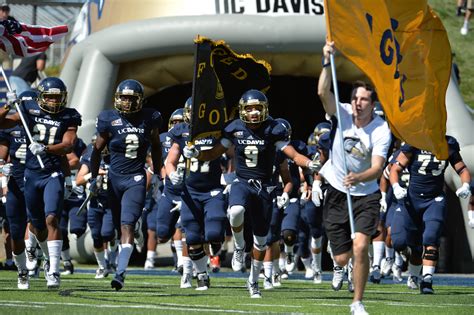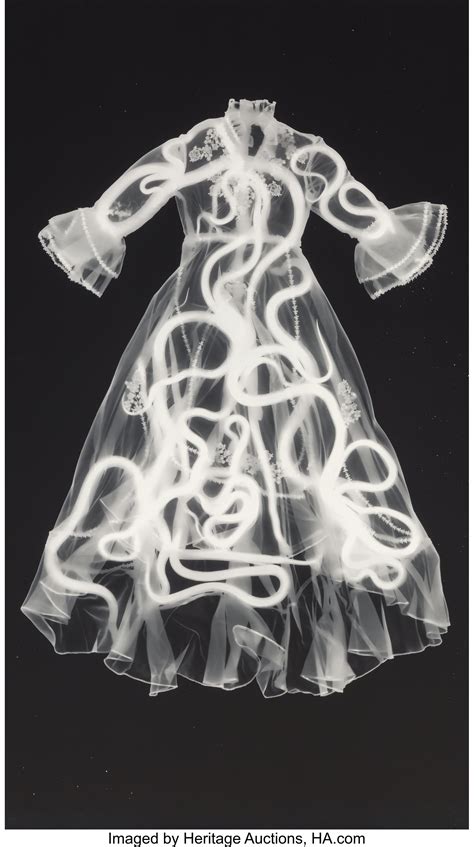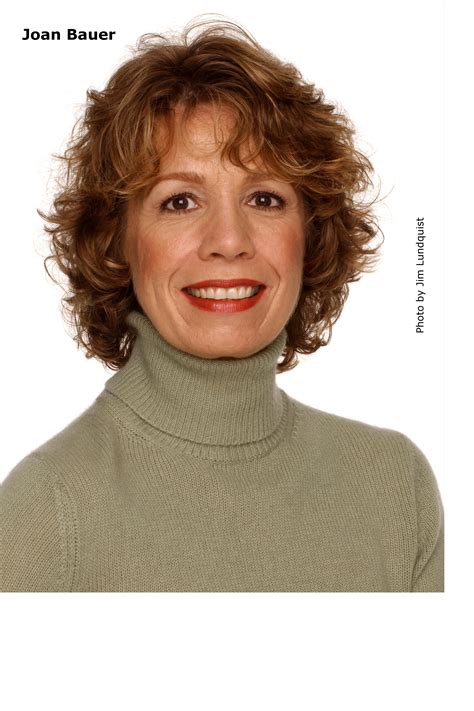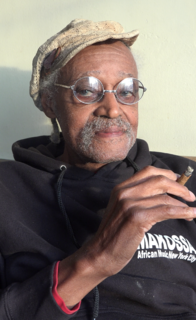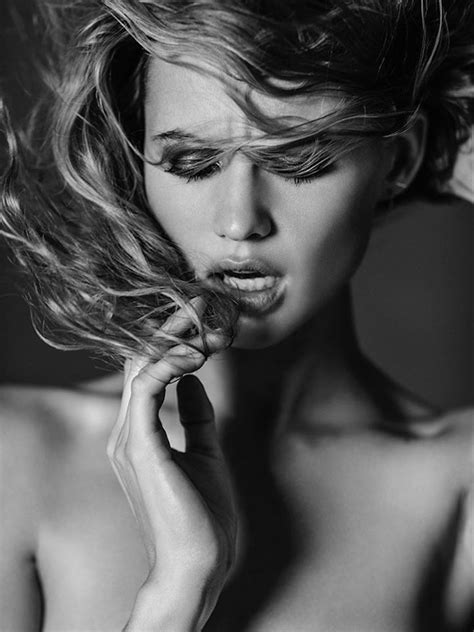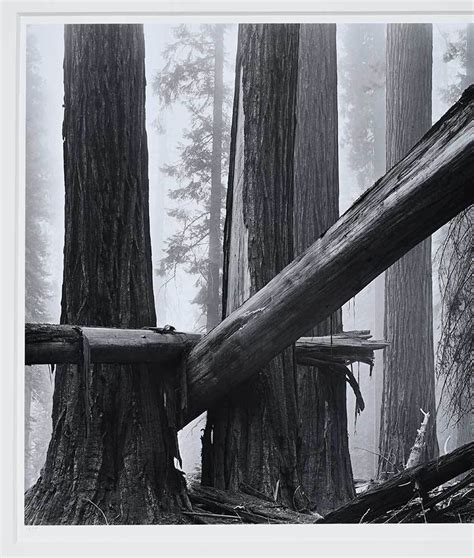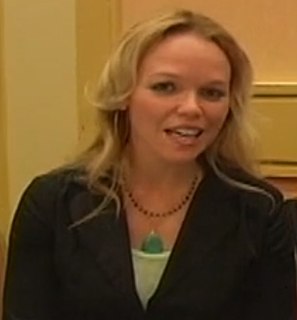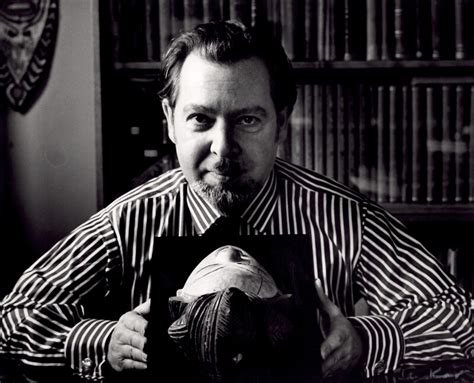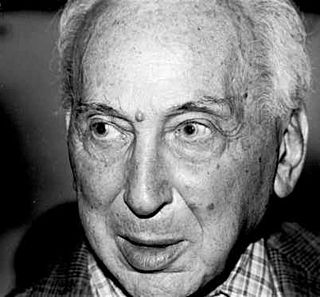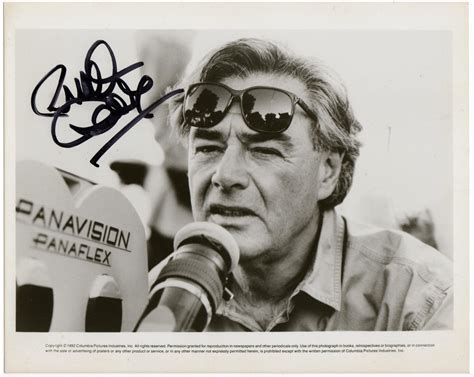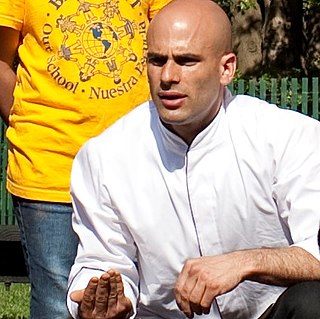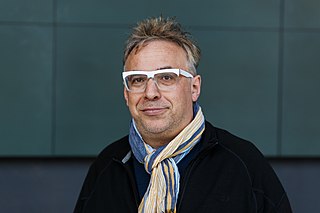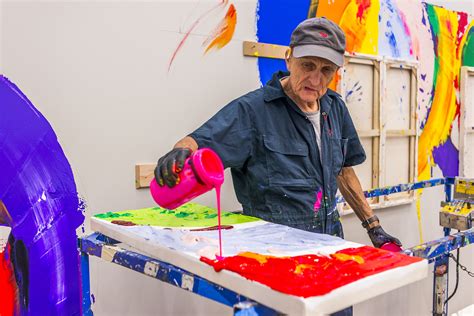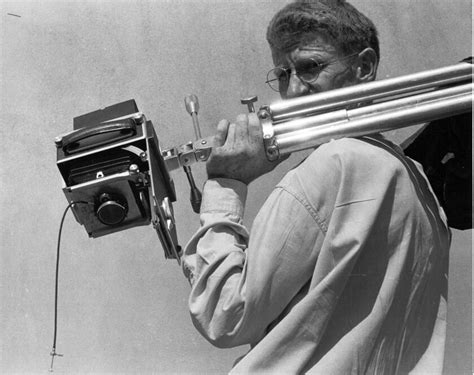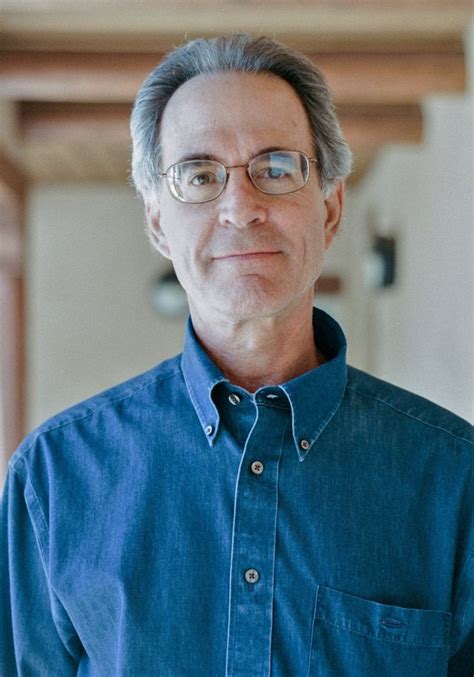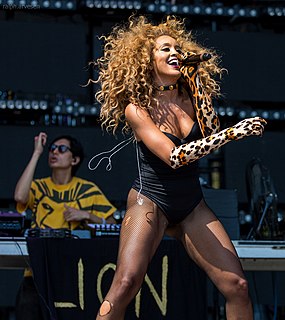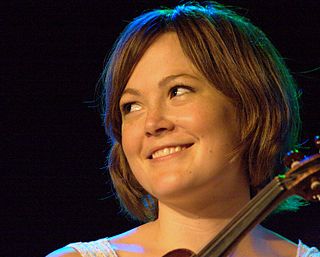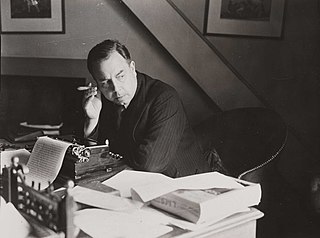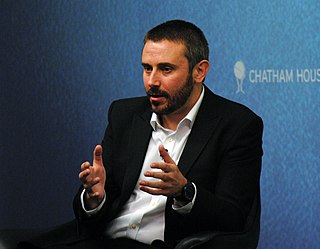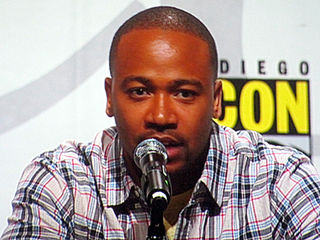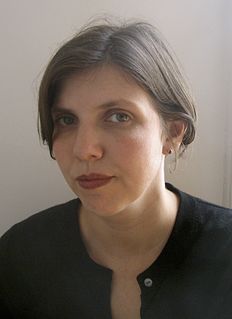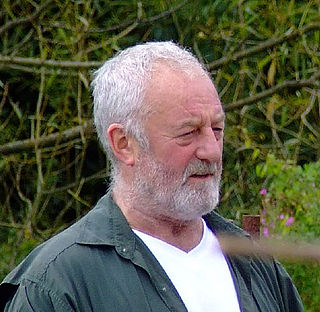Top 585 Lens Quotes & Sayings - Page 9
Explore popular Lens quotes.
Last updated on December 4, 2024.
I had very good LSD, but the problem was - I tried making a film, or doing some filming, when I was on LSD, and it's impossible. I couldn't focus. I tried focusing, but when I looked through the lens, I'd see all different layers of focus, and I couldn't find which was the real one behind the camera. And I just thought, this does not work, and I never tried that again.
The way Americans most understand the history of Latinos in this country, a lot of it is being told now through the lens of what's happening with the immigration debate. While that's an important debate that has security and moral implications, in my view, there's also a huge history of Latinos in the United States that's never been told.
You and I can profit by asking ourselves: What do I see when I look through the lens of my attitude toward myself? Am I more a critic than a friend? Do I look beyond the surface blemishes to find the truly beautiful and unique person that I am? Or do I play the destructive "comparison game"? What verdict does the juror of my mind pass on me: "good at heart" or "guilty on all counts"?
What does it mean to be an American today? The question of that is always pointing at now. It allows someone to say what lens that will be through. A lot of my work has been about identity in different ways. Part of that for me falls into the question of gender identity certainly but also about what it means to be an American theater artist.
To me, feminism in literature deals with the female characters being in some way central to the thematic concerns of the book, or that they are agents of change to some degree. In other words, the lens is focused deeply and intensely on the female characters and doesn't waver, which allows for a glimpse into the rich inner lives of the characters.
We're so conditioned to the syntax of the camera that we don't realize that we are running on only half the visual alphabet... It's what we see every day in the magazines, on billboards and even on television. All those images are being produced basically the same way, through a lens and a camera. I'm saying there are many, many other ways to produce photographic imagery, and I would imagine that a lot of them have yet to be explored.
I had taken the photograph from afar (distance being the basic glitch in our relationship), using my Nikon and zoom lens while hiding behind a fake marble pillar. I was hiding because if he knew I'd been secretly photographing him for all these months he would think I was immature, neurotic and obsessive. I'm not. I'm an artist. Artists are always misunderstood.(Thwonk)
No film is made without the people behind the lens. Of course, most people, even I, tend to look at films in the most simplistic way, and say, "Wow, so-and-so is in this film." We talk about who's in it, as opposed to who got it made. But there are financial and technical aspects which go along with it, that should be addressed and acknowledged, including those minorities who are doing excellent work as well.
He was already looking at their relationship through the lens of the past tense. It puzzled her, the ability of romantic love to mutate, how quickly a loved one could become a stranger. Where did the love go? Perhaps real love was familial, somehow, linked to blood, since love for children did not die as romantic love did.
I could only shoot when the subway was on the other platform. Little things like that, and the platform is very narrow. It's not like you can hide if a subway comes so a lot of things happened because of that. Or a thousand people just came and looked straight into the lens like they didn't expect a movie to be shooting.
When you step in to act, you just zoom way in on the longest possible lens and you're just totally in the point of view of your character and you have to forget about everyone else. You don't care about what anybody else is, what they want or what they're trying to do. You're just concerned with your circumstances, what you're trying to get out of someone or some scene.
I start with no preconceived idea - discovery excites me to focus - then rediscovery through the lens - final form of presentation seen on ground glass, the finished print previsioned completely in every detail of texture, movement, proportion, before exposure - the shutter's release automatically and finally fixes my conception, allowing no after manipulation - the ultimate end, the print, is but a duplication of all that I saw and felt through my camera.
I was photographing the photographer Brassaï. He had very prominent eyes, like a frog's. As I focused my lens, he brought his hand up and pretended to focus his eye. It was a joke, but it added mystery to the picture. There's a sense of action in a very small world. Or with Allen Ginsberg there were people smoking cigarettes and in the smoke there's a sense of motion. It makes much out of very little.
I think it's very disheartening and undermining to focus on nostalgia or youthful sentimentality as the lens through which you view art and culture, because then you feel like everything good already happened. I really just try to be in the present with music and just find the things that are invigorating and make me feel happy to be alive right now.
Photography is an investigation of both the outer and the inner worlds. The first experiences with the camera involve looking at the world beyond the lens, trusting the instrument will 'capture' something 'seen.' The terms shoot and take are not accidental; they represent an attitude of conquest and appropriation. Only when the photographer grows into perception and creative impulse does the term make define a condition of empathy between the external and the internal events.
This house has been far out at sea all night, The woods crashing through darkness, the booming hills, Winds stampeding the fields under the window Floundering black astride and blinding wet Till day rose; then under an orange sky The hills had new places, and wind wielded Blade-light, luminous black and emerald, Flexing like the lens of a mad eye.
In books, day breaks, and night falls. In life, night rises from the ground. The day hangs on for as long as it can, bright and eager, absolutely and positively the last guest to leave the party, while the ground darkens, oozing night around your ankles, swallowing for ever that dropped contact lens, making you miss that low catch in the gully on the last ball of the last over.
Composition is what's similar between being photographer and director. As a photographer, you're sort of doing everything - you're directing the lights and you're framing and you're moving around. The hardest thing to learn as a director is how cameras have to move. You have to have patience, you have to learn how to look through the lens and then you have to learn to combine all of the compartments into one great image.
I'd really rather leave it to others to say what they see in it and to see if I've put something into my photographs beyond a mere recording. Yes, I've chosen the camera position, how I'm going to print the negative, the angel of the lens, what I'm going to include and exclude in the composition, so on and so forth. But, I'm still photographing a work of art, and I would rather leave it to others to comment on my work, as I just left it to you.
Mindfulness is the ability to be aware, to note, to notice. When we apply that to our thoughts and mental habits, we bring a clarity of awareness in seeing what's just an ordinary thought and what's a judging thought that's pejorative or putting us down in some way. So, we first bring that lens of awareness, and then we can do all kinds of different strategies. We can inquire.
Neither camera, nor lens, nor film determine the quality of pictures; it is the visual perception of the man behind the mechanism which brings them to life. Art contains the allied ideas of making and begetting, of being master of one's craft and able to create. Without these properties no art exists and no photographic art can come into being
... if, as women, we accept a philosophy of history that asserts that women are by definition assimilated into the male universal,that we can understand our past through a male lens--if we are unaware that women even have a history--we live our lives similarly unanchored, drifting in response to a veering wind of myth and bias.
For this very reason I refuse all the tricks of the trade and professional virtuosity which could make me betray my career. As soon as I find a subject which interests me, I leave it to the lens to record it truthfully. Look at the reporters and at the amateur photographer! They both have only one goal; to record a memory or a document. And that is pure photography.
It is essential for the photographer to know the effect of his lenses. The lens is his eye, and it makes or ruins his pictures. A feeling for composition is a great asset. I think it is very much a matter of instinct. It can perhaps be developed, but I doubt if it can be learned. To achieve his best work, the young photographer must discover what really excites him visually. He must discover his own world.
The autobiographer looks at life through the lens of his or her own life and really uses herself or himself as the jumping-off place to examine the social mores and the economic and political climates. In a way, the autobiography becomes history as well as the story of one person, for it becomes the story of a family or the story of the state or nation.
The menu of this kitchen will have more than soup; it will serve as an opportunity to explore the vast untapped power of food as a force for participatory democracy, as a means of empowerment for those who have little and as a lens through which we embrace, and in fact relish, our differences but see and live through our commonalities. If you eat, then you are a part of this.
... what is faked [by the computerization of image-making], of course, is not reality, but photographic reality, reality as seen by the camera lens. In other words, what computer graphics have (almost) achieved is not realism, but rather only photorealism - the ability to fake not our perceptual and bodily experience of reality but only its photographic image.
During my performances, I don't like folks to take pictures because I feel that we live in a very photographic time. Photography was invented over 100 years ago, and now it's at its peak because everyone has a camera. The fact that they are taking experiences and filtering them through a mechanical lens I find amazing, but also disheartening. Amazing when you have photographs that start revolutions. Disheartening when you have people making photographs but not living.
The heart sags. My footprints forget me.
I don’t think anything will ever be the same.
This is the edge of the cliff and you can’t move,
can’t jump. Everything is vertical. With binoculars
you can see where you’ll be in an hour. Raindrops
collect on the lens. A fine mist. It hides us.
It drifts into clocks. Gravity presses your hands.
Some hurts never get said. Some get smuggled.
Photography is a life of learning. That's all I want from photography. I don't want the money. I don't need the fame. I don't need the admiration. I'd like all of those things, but I don't need them. Because what I get from photographing is learning. I have spent my life learning by looking through a lens.
There were days, rainy gray days, when the streets of Brooklyn were worthy of a photograph, every window the lens of a Leica, the view grainy and immobile. We gathered our colored pencils and sheets of paper and drew like wild, feral children into the night, until, exhausted, we fell into bed. We lay in each other's arms, still awkward but happy, exchanging breathless kisses into sleep.
The pineal gland of evolutionarily older animals, such as lizards and amphibians, is also called the 'third' eye. Just like the two seeing eyes, the third eye possesses a lens, cornea, and retina. It is light-sensitive and helps regulate body temperature and skin coloration-two basic survival functions related to environmental light.
Photography is much more about elimination than inclusion. The images we make with a lens typically eliminate ninety percent of our field of view and everything that is out of our field of view. The shutter slices time, eliminating all moments before and after it opens and closes. Three dimensions are reduced to two. And in some cases color is removed. How can we call these kinds of artifacts unaltered?
My favorite method of encryption is chunking revolutionary documents inside a mess of JPEG or MP3 code and emailing it off as an "image" or a "song." But besides functionality, code also possesses literary value. If we frame that code and read it through the lens of literary criticism, we will find that the past hundred years of modernist and postmodernist writing have demonstrated the artistic value of similar seemingly arbitrary arrangements of letters.
Independent of the critique I'm making, I'm just trying to paint a more comprehensive portrait of American religion than you get from a right versus left, religious conservatives versus secular liberal, believer versus atheist, binary. Too often, we just look at religion in America through that kind of either/or lens. I think it's much more complicated than that.
There was a band in San Diego, Bluegrass Etc, that played a weekly gig. My parents would take my brother and me every Saturday night for 7 or 8 years. Sean and I started taking lessons with them and they gave us a great foundation in bluegrass instrumentation. They were the lens through which I saw music for a very long time.
Often as a poet I find that I am somewhat outside an experience I want to hold onto, consciously taking mental notes or writing them down in my journal - for fear that I will forget. It's not unlike being on a trip and taking pictures, your face behind a camera the whole time - the entire experience mediated by a lens.
I am in an endless journey towards an infinite route, only to find a real world of humanity. This thirst is eternal. I will keep walking, touching every faces I drop through my lens. I will show the world - those unknown stories of sufferings. If a single hand comes to give them a shade that is the real honor of my sweat
On the 1st of August, 1774, I endeavoured to extract air from mercurius calcinates per se [mercury oxide]; and I presently found that, by means of this lens, air was expelled from it very readily. … I admitted water to it [the extracted air], and found that it was not imbibed by it. But what surprized me more than I can well express, was, that a candle burned in this air with a remarkably vigorous flame… I was utterly at a loss how to account for it.
If you view everything through the lens of fear, then you tend to stay in retreat mode. You can just as easily see a crises or problem as a challenge, an opportunity to prove your mettle, the chance to strengthen and toughen yourself, or a call to collective action. By seeing it as a challenge, you will have converted this negative into a positive purely by a mental process that will result in positive action as well.
I think that you have to have a really specific type of personality to be able to both direct and act, because it requires enormous shifts in perspective. I mean, when you're directing, you're looking at the world through a wide-angle lens, and you're seeing all of it. You know exactly what's happening in every corner of it. You know what people are going to say. You know what they're going to do. You're controlling everything.
The bat was looking at Theo and Theo was having trouble following his own thoughts.The bat was wearing tiny sunglasses.Ray Bans,Theo could see by the trademark in the corner of one lens."I'm sorry, Mr.,uh- Case, could you take the bat off your head.It's very distracting." Him." Pardon?" It's a him.Roberto.He no like the light.
Because I didn't see war in Iraq through the partisan lens that seems to dominate a lot of the perspective today with Fox News on the one side and MSNBC on the other, I didn't see it as Democrats good, Republicans bad. I saw it as a situation where the United States is a force that engages in these military operations around the world, and it's the job of journalists to provide the American people with information they can use to make informed decisions.
I take bits and pieces from every director. I'd say Sylvain [White] and Nimrod [Antal]. They were more about teaching me lens sizes and depth of field and how to move the camera and lighting. I do want to direct and I didn't go to film school, so having a director that are very much hands on that way and looking to let me learn, that is a key factor.
My approach to photograph is kept simple, almost routine. All work, good and bad, is documented. I use standard film, a standard lens and no filters. Each work grows, strays, decays-integral parts of a cycle which the photograph shows at its height, marking the moment when the work is most alive. There is an intensity about a work at its peak that I hope is expresses in the image. Process and decay are implicit.
I think that when we're looking at things when we're right in the center of things, as opposed to being a bit unmoored from what's going on around us, we see things through a kind of dulling lens of convention, and there's something about extreme emotional experiences that gives us a heightened clarity, I think, of thought and of feeling.
When I'm meditating on an idea, I try to let the idea completely saturate me to the point where I feel like I'm covering myself in it or totally immersing myself in it, so that everywhere I'm looking, everywhere I'm going, it's through the lens of that idea. And that's sort of what I do with the music - I try to lose myself in it.
The fact is that relatively few photographers ever master their medium. Instead they allow the medium to master them and go on an endless squirrel cage chase from new lens to new paper to new developer to new gadget, never staying with one piece of equipment long enough to learn its full capacities, becoming lost in a maze of technical information that is of little or no use since they don't know what to do with it.
Most of us hide behind egocentric biases that generate the illusion that we are special. These self-serving protective shields allow us to believe that each of us is above average on any test of self-integrity. Too often we look to the stars through the thick lens of personal invulnerability when we should also look down to the slippery slope beneath our feet.




